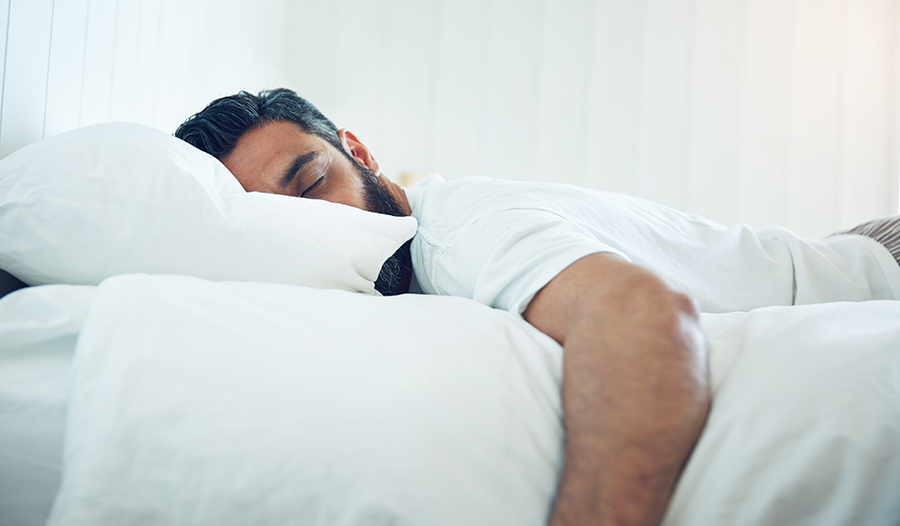Melatoninfördelar: 4 hälsotillstånd det kan hjälpa till med

Om du någonsin har varit frustrerad över att försöka få en god natts sömn, kanske du har hört talas om melatonin. Det är ett vanligt rekommenderat tillskott för användning som sömnhjälpmedel.
Men innan du bestämmer dig för att prova själv, kanske du vill ha lite mer information. Så här är en introduktion till melatonin, dess fördelar och hur man använder det.
Vad är melatonin och hur fungerar det?
Melatonin är ett naturligt hormon som skapas av tallkottkörteln i hjärnan. När det fungerar normalt i människokroppen frigörs melatonin av hjärnan som svar på en ljusförändring. Med mindre ljus som kommer in genom ögonen på natten produceras mer melatonin.
Melatonin färdas sedan genom blodomloppet och cerebrospinalvätskan (vätskan som omger hjärnan och ryggmärgen) till olika delar av kroppen. När hormonet binder till kroppens melatoninreceptorer signalerar det att tiden för sömn har kommit, vilket får kroppen att slappna av och sänka sin kärntemperatur. Så här spelar melatonin en roll i regleringen av kroppens inre klocka, även kallad dygnsrytmen.
Således styr uppgången och nedgången av kroppens melatoninnivå sömn-vakningscykeln.
Generellt, varje dag i cykeln, börjar melatoninnivån öka efter solnedgången. Detta motsvarar en större benägenhet för sömn ungefär två timmar före kroppens normala sömntid. Nivån förblir förhöjd, så länge mörkret kvarstår, vanligtvis i en koncentration som är minst 10 gånger högre än mängden dagtid. Sedan, när solen stiger tidigt på morgonen, sjunker melatoninnivån, vilket signalerar kroppen att vakna.
Melatonin och säsongsmässig affektiv störning
Förutom kroppens dygnsrytm som löper i en ungefär 24-timmars cykel, finns det också en säsongscykel för melatonin. När nätterna är längre under hösten och vintern är melatoninnivåerna vanligtvis högre. Omvänt, under våren och sommaren, nivåerna är lägre.
På grund av de kortare dagarna och längre nätter under vintern kan kroppens naturliga sömn-vakningscykel störas. Detta kan leda till att en form av depression utvecklas ungefär samma tid varje år. Tillståndet kallas säsongsbunden affektiv störning (SAD) och symtomen kan inkludera sömnproblem, agitation, låg energi, förändringar i aptit och deprimerat humör.
Melatonin påverkas inte bara av solljus utan också artificiella ljuskällor. Även exponering för svagt ljus kan undertrycka den vanliga produktionen av melatonin på natten. Så ljus från en smartphone, tv eller datorskärm när det används nära sänggåendet kan minska melatoninsekretionen, vilket påverkar sömnen negativt.
Förutom ljus kan specifika livsmedel också påverka melatoninnivåerna. Ris, valnötter, oliver, körsbär, tomater, jordgubbar och komjölk är bland de livsmedel som innehåller melatonin. Efter att ha absorberat hormonet från dessa livsmedel kan kroppen börja slappna av, vilket gör att du känner dig lugn och sömnig.
4 hälsotillstånd som melatonin kan hjälpa till med
Det verkar inte finnas några signifikanta hälsoproblem förknippade med melatoninnivåer, vare sig de är låga eller höga. Och medan melatonin inte krävs för att sömn ska uppstå, gör ökade nivåer det lättare att somna. På grund av dess avslappnande effekter har melatonintillskott varit till hjälp vid vissa tillstånd.
1. Fördelar med sömnlöshet
Personer som lider av sömnlöshet kan hitta lättnad med melatonin. Forskning visar att melatonintillskott kan hjälpa människor att somna snabbare och öka deras sömntid.
2. Fördelar med jetlag
Jetlag kan uppstå när du reser över flera tidszoner snabbt, vilket orsakar störningar i det normala sömnmönstret. Symtom kan inkludera sömnlöshet, trötthet på dagtid, nedsatt koncentration och matsmältningsproblem. Studier har visat att melatonin minskar de övergripande symtomen på jetlag.
3. Fördröjd sömnväckningsfasstörning (DSWPD) Fördelar
Fördröjd sömnväckningsfasstörning är ett tillstånd där dygnsrytmen är dåligt reglerad. Personer med DSWPD har svårt att somna tills en tid som är försenad 2 eller fler timmar bortom den konventionella sänggåendet. De kämpar också för att komma upp ur sängen på morgonen. För dem börjar sömnen runt 02.00 till 06.00 och de föredrar att vakna mellan 10:00 och 13:00.
Forskning på personer med DSWPD har visat fördelar när man tar melatonin en timme före önskad sänggåendet i kombination med att gå och lägga sig vid en viss tid varje natt. Förbättringar i dagtid, bättre sömn under den första tredjedelen av natten och somna vid en tidigare tidpunkt har noterats.
4. Ångestfördelar
Ångest före operation är en vanlig förekomst. En genomgång av ny forskning ger starka bevis på att melatonintillskott minskar ångest som upplevs före operationen. Faktum är att det kan vara lika effektivt som den ångestdämpande medicinen midazolam.
Hur och när du ska ta melatonin
Melatonin finns att komplettera i tablett-, kapsel-, gummi-, pulver-, flytande- och pastillformer. Den rekommenderade dosen för melatonin varierar mellan individer. Olika faktorer, inklusive kroppsvikt, ämnesomsättning och allmän hälsa, kan påverka kroppens svar på melatonin.
För bästa resultat, ta melatonin 30-60 minuter före sänggåendet. National Sleep Foundation rekommenderar en vuxen dos mellan 0,2 mg och 5 mg dagligen. Dosen kan ökas gradvis efter behov tills tillräcklig sömn uppnås. Rådgör med en vårdgivare innan du försöker öka dosen över 5 mg.
När du påbörjar en studie av melatonin är det klokt att börja med en låg dos och övervaka eventuella biverkningar. Om morgontrötthet blir ett problem kan du försöka minska dosen eller ta den tidigare.
Melatonin bör också åtföljas av (och inte användas som ersättning för) hälsosamma sömnmetoder. Dessa inkluderar inget koffein, ingen elektronik eller upplysta skärmar strax före sömnen, en konsekvent sänggåningsrutin och en vanlig sänggågs- och vakningstid.
Eftersom melatonin är en naturlig kemikalie verkar melatonin i allmänhet vara säkert för kortvarig användning hos de flesta människor. Trots det bör potentiella biverkningar av huvudvärk, yrsel och sömnighet på dagtid avskräcka från användning vid körning.
Som med alla kosttillskott bör dock personer som tar mediciner prata med sina vårdgivare innan de provar melatonin. Det är möjligt för melatonin att orsaka skada genom att interagera med andra läkemedel, kanske minska deras effektivitet, utlösa negativa biverkningar eller ändra hur kroppen metaboliserar läkemedlet.
Medicinsk övervakning rekommenderas för melatonintillskott hos dem som har epilepsi och de som tar blodförtunnande läkemedel. Dessutom, enligt 2015 års riktlinjer från American Academy of Sleep Medicine, rekommenderas inte melatoninanvändning för personer med demens.
Melatoninanvändning hos barn
Eftersom det är ett naturligt förekommande hormon, är melatonin ett populärt val som sömnhjälpmedel för barn. Det verkar vara generellt säkert för kortvarig användning hos de flesta barn.
Forskning på barn med sömnlöshet har visat att melatonin kan minska tiden att somna i fall av autism, uppmärksamhetsbrist och andra neuroutvecklingsstörningar.
Överväg melatonin endast för ett barn efter samråd med sjukvårdspersonal. Innan tillskott påbörjas är det viktigt för en barnläkare att utvärdera barnet för potentiella orsaker till sömnlöshet. Ångest (t.ex. stress om skolan), vissa mediciner, en annan sömnstörning (t.ex. rastlösa bensyndrom, obstruktiv sömnapné) och medicinska eller psykiska hälsotillstånd (t.ex. astma, depression) kan alla vara möjliga orsaker.
För det mesta är melatonin inte lämpligt att ge till ett friskt, normalt utvecklande barn under tre år. Svårigheter med sömn hos sådana barn är vanligtvis beteendemässiga - kanske vägran att sova eller långvariga nattuppvakningar som kräver föräldrarnas uppmärksamhet.
Det finns mycket lite forskning om långtidsanvändning av melatonin hos barn. I teorin kan det ha effekter på att utveckla immun-, metaboliska, reproduktiva och kardiovaskulära system.
I vilket fall som helst bör melatonin inte vara den enda behandlingen för ett barns sömnlöshet. Det bör alltid kombineras med beteendemässiga ingrepp som en vanlig sänggåningsrutin, konsekvent sömnschema, positiv förstärkning för att stanna i sängen och undvikande av stimulerande aktiviteter före sänggåendet.
ANSVARSFRISKRIVNING:Denna Wellness Hub avser inte att tillhandahålla diagnos ...
















































































 Innehållsförteckning
Innehållsförteckning














